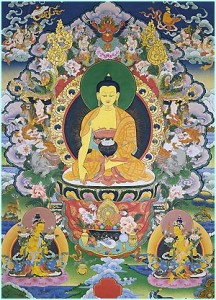An excerpt from a teaching by Jetsunma Ahkon Lhamo from the Vow of Love series
Did you ever watch yourself when you were young? Did you see what you did? Do you watch young people now? Look at the teenagers you know. They are invariably right. They know everything. I knew everything at that age, too, so I understand. They know beyond everything. If there is more than everything, they know it. They have all the answers.
We are also like that. We are locked within a time-and-space grid. When we drop something, it falls, immediately. What makes it so immediate? If it were to hang in the air for ten years, then fall, invariably we would convince ourselves it’s never going to fall. But since it falls immediately, since when we stick our hands in the fire, it hurts immediately, we believe that. Old age, sickness and death we don’t believe. We sort of get it, but it’s in the back of our minds somewhere.
Why is it we don’t fully believe in cause and effect, even though we take into account the passage of time? It’s because we are trying to be happy, so we convince ourselves that cause and effect is not absolute. Why is that? How is it that we can understand that we create the causes of suffering in our mind, and yet still convince ourselves it will not bear the fruit of suffering? It’s because karma appears to ripen in different ways. Karma can ripen immediately. If I drop something and it falls, this is karma ripening. I dropped it; it fell. Karma can also ripen in a different way.
Because of your belief that self-nature is inherently real, you have created the delusion of a self. Self has a beginning and it has an end, and that is the cause for death. The cause for death is the belief in self-nature as being real; that is why people die. Yet you will convince yourself it is okay to believe in self-nature, that there is no problem as long as you can find a way to make self happy. You think it’s going to be okay. But you are still going to die. We are doing this to ourselves, and we don’t even realize it. The self is a finite thing. It had a beginning, a time when it was conceived. There was a time when the thought of self-nature as being inherently real first manifested. Since that is so, then it also must end. If there is a beginning, there is an end.
In the same way, we are constantly engaged in creating things that are the karmic causes of our own suffering, but we don’t make a connection. The reason we don’t make a connection is due to the other kind of karmic ripening, the one that you don’t see in this life. The karma that ripens after a long time, an intermediate time, or even a short time, are karmic ripenings that you actually do not see in this lifetime.
Here then is a problem. Here is one of the reasons why it becomes very difficult to realize the unchangeable truth that all sentient beings wish to be happy, and yet not realizing how to create the causes of happiness, create instead the causes of suffering.
Many of the things that we have suffered in this lifetime seem to have been put upon us in an innocent way. We were innocent. Why is someone born with a cleft palate? Why are some of us born with a crippling condition, some handicap? Why do some of us become ill or die when we have tried to live a good life, when we have done everything we can to be kind to other human beings and have never killed anyone? It is because many of the causes that we see in this lifetime have come from a time before.
Now, from my point of view, if you don’t believe in reincarnation you have no access to the technology of Buddhism. You have to accept the idea you have lived before, and that some of the results you see ripening in your life now are ripening due to causes created in a time you do not know. And that some of the causes you are creating now – because you are creating causes constantly – will ripen in a time you cannot see. If you don’t accept that, Buddhist or not Buddhist, you cannot evolve in your mind; you cannot adapt and have the strength to continue. In fact, you cannot have the perspective to practice the antidote to suffering. Everyone who has ever been considered a living Buddha on this earth has taught reincarnation. So maybe you might want to consider it an idea that you could adopt.
© Jetsunma Ahkön Lhamo












Jetsunma, I am currently re-reading your book “Stabilizing the Mind” and now I am getting it, just a little. I am learning how to disengage, and how to create spaciousness. My business is currently going through a slow patch, but I am not panicking, as I have in the past, because my mind is more spacious and, besides, what does it really matter.
Thank you from the deepest place in my heart for being such a true spiritual friend to your students.